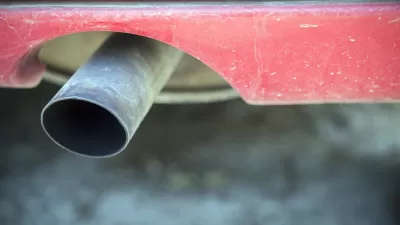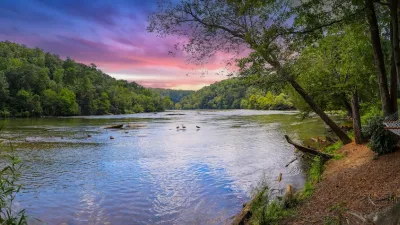Residents in 600 American neighborhoods are breathing air with levels of pollution that put them at an elevated risk of developing cancer.
The levels of pollutants put almost three times as many people in these 600 neighborhoods at risk of developing cancer compared to the national average.
"The levels of 80 cancer-causing substances released by automobiles, factories and other sources in these areas exceed a 100 in 1 million cancer risk. That means that if 1 million people breathed air with similar concentrations over their lifetime, about 100 additional people would be expected to develop cancer because of their exposure to the pollution.
The average cancer risk across the country is 36 in 1 million, according to the National-Scale Air Toxics Assessment, which will be released by the EPA on Wednesday."
Thanks to Grist
FULL STORY: Air has elevated cancer risk in 600 neighborhoods

Trump Administration Could Effectively End Housing Voucher Program
Federal officials are eyeing major cuts to the Section 8 program that helps millions of low-income households pay rent.

Planetizen Federal Action Tracker
A weekly monitor of how Trump’s orders and actions are impacting planners and planning in America.

Ken Jennings Launches Transit Web Series
The Jeopardy champ wants you to ride public transit.

Rebuilding Smarter: How LA County Is Guiding Fire-Ravaged Communities Toward Resilience
Los Angeles County is leading a coordinated effort to help fire-impacted communities rebuild with resilience by providing recovery resources, promoting fire-wise design, and aligning reconstruction with broader sustainability and climate goals.

When Borders Blur: Regional Collaboration in Action
As regional challenges outgrow city boundaries, “When Borders Blur” explores how cross-jurisdictional collaboration can drive smarter, more resilient urban planning, sharing real-world lessons from thriving partnerships across North America.

Philadelphia Is Expanding its Network of Roundabouts
Roundabouts are widely shown to decrease traffic speed, reduce congestion, and improve efficiency.
Urban Design for Planners 1: Software Tools
This six-course series explores essential urban design concepts using open source software and equips planners with the tools they need to participate fully in the urban design process.
Planning for Universal Design
Learn the tools for implementing Universal Design in planning regulations.
Ada County Highway District
Clanton & Associates, Inc.
Jessamine County Fiscal Court
Institute for Housing and Urban Development Studies (IHS)
City of Grandview
Harvard GSD Executive Education
Toledo-Lucas County Plan Commissions
Salt Lake City
NYU Wagner Graduate School of Public Service





























